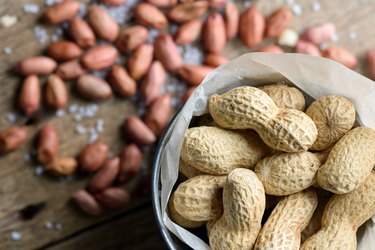
The peanut, a source of vitamins, protein and fiber, is one of America's favorite snack foods. Peanut shells, not so much. While eating peanut shells may have never entered your mind, some people do indulge in this unusual snack. It could be the crunch or the saltiness that appeals to those looking for an alternative to chips and pretzels. But you should consider the possible health risks before eating peanut shells as part of your regular diet.
Although peanut shells can be eaten, they can be contaminated with pesticides and might cause digestive issues.
Video of the Day
Video of the Day
Peanut Shell Nutrition
According to Virginia-Carolinas Peanuts Promotions, "Many people report they enjoy peanuts, including the shell, and food scientists indicate that it's okay." But what exactly is in them? Peanut shell content is as follows:
- 60 percent crude fiber
- 25 percent cellulose
- 8 percent water
- 6 percent crude protein
- 2 percent ash
- 1 percent fat
The composition differs based on peanut varieties and manufacturing environments. Other than dietary fiber, peanut shells offer virtually no nutritional value.
Intestinal Blockage Concerns
Eating peanut shells may provide fiber, but they can also interfere with normal digestive function. Peanut shells can accumulate in the gastrointestinal tract. Often, the buildup of foreign matter causes stomach distress and creates a mass that cannot pass through the intestines.
Referred to as a bezoar, the term typically relates to ingesting hair or fibers. However, it also applies to a collection of any consumed material that lodges in the abdomen. According to Mayo Clinic, in extreme cases, surgery may be required to remove a bezoar.
Beware of Pesticide Contamination
A hidden danger of eating peanut shells concerns use of pesticides during cultivation. Peanut farmers expect consumers to discard the shells. Peanut farmers employ crop rotation as one method of disease control.
However, fungal disease can cause extensive crop damage and typically necessitates the use of chemical pesticides. According to Feedipedia, peanuts are particularly vulnerable to the fungi Aspergillus flavus and Aspergillus parasiticus that are known to cause cancer in humans. The easiest way to avoid chemical contaminants is to avoid eating peanut shells.
Eating Disorder Considerations
Eating peanut shells may reveal problems beyond simple snack cravings. The habitual consumption of nonnutritive items could indicate an eating disorder, known as pica. Common in children, people lacking certain nutrients and those with developmental disabilities, pica can also affect healthy adults.
Cravings of certain tastes and textures can sometimes compel people to eat unusual materials. If you eat peanut shells every day and think your habit has become an obsession, contact a health care professional. Ask about tests and treatment for nutritional deficiencies and behavior modification techniques.
Health Benefits of Peanuts
But the concerns of eating peanut shells should not stop you from eating peanuts! They're packed with protein and come with some amazing health benefits. In fact, according to a 2015 study published in the International Journal of Epidemiology, people who consumed 10 or more grams of nuts per day, including peanuts, had lower incidence of:
- Cardiovascular disease
- Cancer
- Neurodegenerative disease
- Respiratory conditions
- Diabetes
- Kids Health: Pica
- Virginia-Carolinas Peanuts Promotions: Frequently Asked Questions
- Focus on Autism and Other Developmental Disabilities: Understanding Pica Behavior
- Mayo Clinic: Bezoars: What Foods Can Cause This Digestive Problem?
- International Journal of Epidemiology: Relationship of Tree Nut, Peanut and Peanut Butter Intake with Total and Cause-Specific Mortality: A Cohort Study and Meta-Analysis
- Feedipedia - Animal Feed Resources Information System: Peanut Hulls
- University of Maryland Medical Center: Intestinal Obstruction
- North Carolina State University; Wildlife and Pesticides-Peanuts; William E. Palmer, et al.